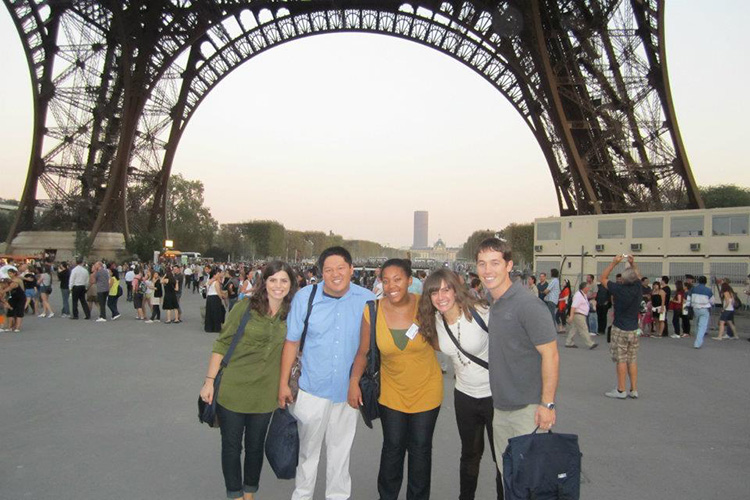Shande King of Knoxville, Tennessee, is not your typical math teacher. A current graduate student, he is working on his sixth degree—and his fifth from the University of Tennessee, Knoxville. Self-described as a lifelong learner, King found a passion for both math and French in high school and decided to pursue both at the collegiate level. While many universities encouraged him to choose one discipline, UT allowed him to study both, and thus began a decade-long bond between King and the university.
“I always knew I wanted to be a teacher. I loved helping others learn and I really liked school, so I decided to pursue a career that married the two,” King said. “While I was learning French, I recognized the value in it. I approached it very methodically, like a puzzle to decipher.”

Although math and French seem like an unlikely combination, King noted that the whole purpose of learning a second language is to be able to communicate with others. Similarly, teaching math is also all about communication. “I took that knowledge of how you learn to speak French and how you learn to hear others and applied it to my understanding of math and how I taught math,” he said.
UT’s College of Education, Health, and Human Sciences supported King’s dual passions, arranging a student teaching placement at Farragut High School that allowed him to teach in both fields while he was getting his master’s degree in education. As King was completing his student teaching, his honors advisor, Rebekah Page, saw potential in him as a Fulbright Scholar.
The Fulbright Student Program gives participants the opportunity to study, teach, and conduct research abroad. King’s academic excellence as an honors student and his dual interest in math and French made him an ideal candidate. He applied for and received a Fulbright grant, moving to Paris to serve as an English teaching assistant for a year while conducting research on the differences between math education in France and the US.
Upon returning to the US, King began teaching at Christian Academy of Knoxville. After five years with CAK, he got the itch to expand his skill set and returned to UT for a PhD in math education. “I was intrigued about the communication of learning and how you get students to talk about their math,” King said. While he had offers from other universities, UT was able to retain King as a graduate student because of its sense of community and personal touch from invested faculty members.
“My favorite thing about UT was that I wasn’t just another PhD student, and that was a direct contrast from some of the other schools I interviewed with,” King said. “I can be who I am and become a better version of myself because I feel supported holistically here.”
In addition to his bachelor’s and PhD in math education, he earned a bachelor’s degree in French, and a master’s in secondary education.
King’s current research centers around improving outcomes of K–12 students in mathematics. By implementing small-group discourse strategies in the classroom, King seeks not only to instruct students in mathematical argumentation but also to allow them to create a more positive identity around their mathematical abilities. He has presented at several local, regional, national, and international conferences about math and STEM education, and he served UT as a graduate teaching associate for VolsTeach. In spring 2020, King was a finalist in the Three Minute Thesis competition, a research communication competition hosted by UT’s academic colleges and Graduate School.
He’s currently working on his Master of Mathematics through UT’s online program while teaching introductory-level math at Seattle Pacific University. King is especially thankful for his strong relationships with UT faculty and their support—particularly that of the program director, Professor Anne Ho—as he transitions into teaching math at the higher education level.
“It’s a huge testament to UT why I keep coming back,” King said. “I’ve been teaching for over 10 years now, but I continue to learn from my professors, particularly in this virtual environment. They’ve been able to keep our classes engaging—and that’s something I’m so grateful for and that I’m going to carry into my own teaching.”
King stays in contact with his PhD advisor, Lynn Hodge, and close friends from his mathematics education cohort. He recently accepted a position as assistant professor of mathematics and director of developmental mathematics at Trevecca Nazarene University in Nashville next year. A proud alumnus and soon-to-be five-time graduate, King is looking forward to a long career in education and maintaining lifelong ties to Rocky Top.
—
Originally published in UT News on April 7, 2021

